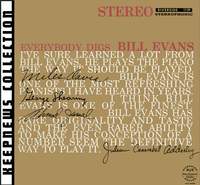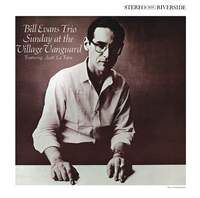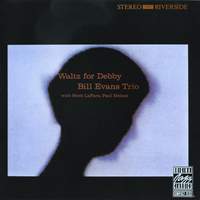Classic Recordings,
Bill Evans - Everybody Digs Bill Evans

It’s time to cover a Bill Evans album, but I was a bit stuck as to which one to go for? I was going to opt for Sunday At The Village Vanguard, the definitive recording he made with the classic trio of drummer Paul Motian and bassist Scott LaFaro (who was tragically killed in a car crash just two weeks later), but my favourite album b is Everybody Digs Bill Evans from 1958. Coming in the period following Evans’s work with Miles Davis on Kind of Blue, the success of which he played a significant part in and two years after his debut New Jazz Conception, a successful but more straightforward bop release, Everybody Digs Bill Evans was the breakthrough album that translated the ideas he had been developing both on stage and in private onto wax. He has the support of drummer Philly Joe Jones and bassist Sam Jones (not related – there tend to be lot of Joneses in jazz), who bring subtlety to the ballads and harnessed energy to the up-tempo tunes.
The memorable cover art is simply a sequence of testimonials about Evans by Miles Davis, George Shearing, Ahmad Jamal and Julian ‘Cannonball’ Adderley, an indication of the respect he commanded amongst his peers. The revolution that Evans represented was a quiet one, introducing a more impressionistic approach, which starts to crystallise on Everybody Digs…. In particular Evans had come up with own way of voicing block chords, which along with his refined pedalling gave the sense of chords hanging in the air, as can be heard on the slow tracks like Young and Foolish and What is there to Say?. Aside from the wisp of an Epilogue, Evans’s sole original composition is the unique Peace Piece, one of the most transcendental recordings in jazz (and a big reason why I chose this over the Village Vanguard recordings), with a strong classical influence. Recorded at the end of the session, it has a twilit, pastoral quality, comparable to Eric Satie’s Gymnopédies or Gnossiennes, sounding both ancient and modern at the same time. Despite many requests over the years, Evans only performed it once on stage, feeling that the spontaneous nature of its creation would be compromised by playing it every night in concert. Evans also cut another version, included as a bonus track, whereby he ingeniously super-imposes the theme underneath the standard Some Other Time, and whilst not as compelling as the original it underlines how innovative Bill Evans could be.
 Whilst Evans is best remembered for his reflective pieces, it’s easy to forget this was just one aspect of an incredibly diverse musician, and he could swing with the best of them. We get several prime up-tempo examples here with Minority, Night and Day and his version of Sonny Rollins’s Oleo, almost Monkish in its broken, unpredictable phrasing. Jones and Jones make for a superlative rhythm machine on these tracks, responsive to Evans’s various flights of fancy. There’s a classic bass and drum breakdown towards the end of Oleo with Philly Joe Jones erratically stop- starting around Sam Jones’s rock-solid bass groove. Impossible to describe in words, it’s immensely satisfying, scratching that itch as only seasoned rhythm section players like them could.
Whilst Evans is best remembered for his reflective pieces, it’s easy to forget this was just one aspect of an incredibly diverse musician, and he could swing with the best of them. We get several prime up-tempo examples here with Minority, Night and Day and his version of Sonny Rollins’s Oleo, almost Monkish in its broken, unpredictable phrasing. Jones and Jones make for a superlative rhythm machine on these tracks, responsive to Evans’s various flights of fancy. There’s a classic bass and drum breakdown towards the end of Oleo with Philly Joe Jones erratically stop- starting around Sam Jones’s rock-solid bass groove. Impossible to describe in words, it’s immensely satisfying, scratching that itch as only seasoned rhythm section players like them could.
Nicely remastered and including extra tracks, including Some Other Time.
Available Formats: CD, MP3, FLAC
As mentioned, the Village Vanguard recordings from 1961 present the Evans/LaFaro/Motian trio at its absolute zenith. It exist now as it did then, split between two items, Sunday at the Village Vanguard and Waltz for Debby
Available Formats: CD, MP3, FLAC





